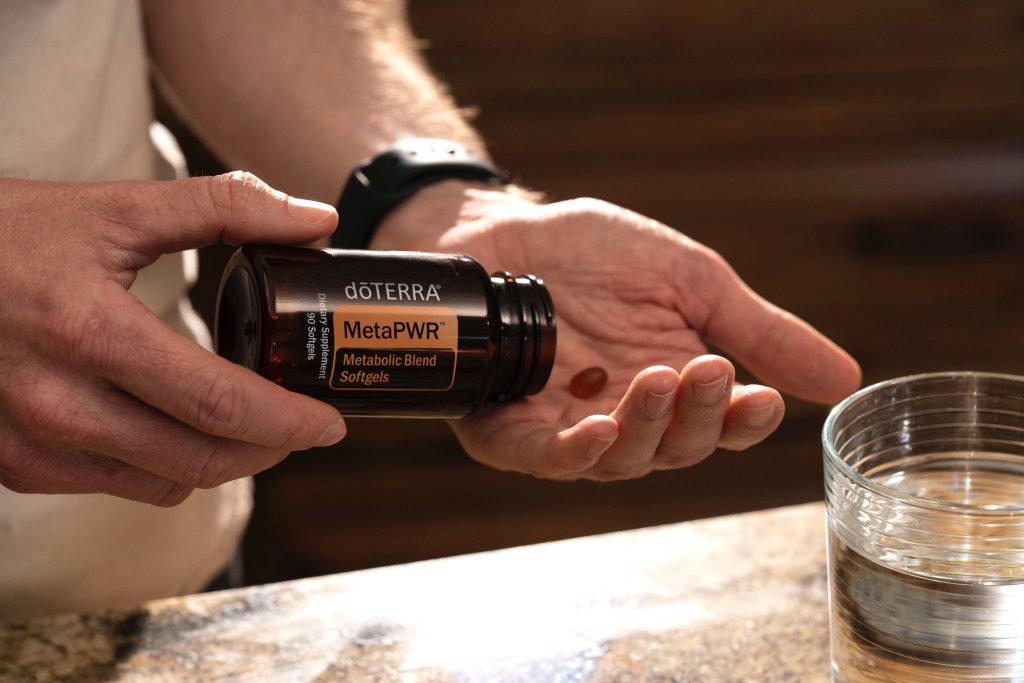Discover the truth about supplements and their impact on metabolism.
Do Supplements Help Boost Metabolism?

Most of us have heard about metabolism, and how it plays a crucial role in our overall health and wellness. But what exactly is metabolism, and can supplements really help boost it? Let’s dive in and explore the science behind metabolism and the potential benefits of metabolism-boosting supplements.
Understanding Metabolism
Metabolism is the sum of all the chemical processes that occur in our bodies to sustain life. It involves converting the food we eat into energy that our cells can use. Think of it as the ultimate energy converter in our bodies!
But what exactly happens during this process? Let’s dive deeper into the world of metabolism and explore its fascinating intricacies.
The Role of Metabolism in the Body
Metabolism is like the engine that keeps our body running smoothly. It regulates essential functions such as breathing, digestion, cell repair, and hormone production. Without metabolism, our bodies would not be able to carry out these vital tasks.
When we eat food, our digestive system breaks it down into smaller molecules, such as carbohydrates, proteins, and fats. These molecules are then absorbed into our bloodstream and transported to our cells. Here, metabolism kicks into action, transforming these molecules into energy that our cells can utilize.
But metabolism is not just about energy production. It also plays a crucial role in maintaining the balance of chemicals in our bodies. It helps eliminate waste products, detoxifies harmful substances, and synthesizes essential compounds that our bodies need for proper functioning.
Factors Affecting Metabolic Rate
Several factors can influence our metabolic rate, the speed at which our bodies convert food into energy. While some people seem to have a faster metabolism than others, it’s important to note that genetics only play a small role in determining metabolic rate.
Age is one factor that affects metabolism. As we get older, our metabolic rate tends to decrease. This is partly due to a loss of muscle mass and a decrease in physical activity levels. However, it’s not all doom and gloom. By maintaining a healthy lifestyle, including regular exercise and a balanced diet, we can help offset the natural decline in metabolic rate that comes with age.
Sex also plays a role in metabolic rate. Men generally have a higher metabolic rate than women, mainly because they tend to have more muscle mass. Muscle tissue is more metabolically active than fat tissue, meaning it burns more calories at rest.
Genetics can influence our metabolic rate to some extent, but it’s not something we have complete control over. Some people may have a naturally faster or slower metabolism based on their genetic makeup. However, lifestyle factors have a more significant impact on metabolic rate than genetics alone.
One of the most influential factors affecting metabolic rate is body composition. Lean muscle mass requires more energy to maintain than fat tissue, so individuals with a higher proportion of muscle tend to have a higher metabolic rate. This is why strength training and resistance exercises are essential for boosting metabolism.
Lastly, lifestyle factors such as diet and physical activity can significantly impact our metabolic rate. Eating a balanced diet that includes a variety of nutrients can help support a healthy metabolism. Regular exercise, especially high-intensity workouts, can also increase metabolic rate both during and after the activity.
So, while genetics may play a small role in determining our metabolic rate, it’s the lifestyle choices we make that have the most significant impact. By understanding the factors that affect metabolism and making conscious choices to support a healthy lifestyle, we can optimize our body’s energy converter and maintain overall well-being.
The Science Behind Supplements and Metabolism
Now, let’s get into the nitty-gritty of supplements and their potential impact on metabolism. Whether you’re aiming to shed a few pounds or simply boost your energy levels, understanding how supplements interact with the body is crucial.
How Supplements Interact with the Body
Supplements are designed to provide the body with specific nutrients, vitamins, or minerals that may be lacking in our regular diet. When it comes to metabolism-boosting supplements, they usually contain ingredients that promote energy production, fat burning, or regulate metabolic processes.
One common ingredient found in metabolism-boosting supplements is green tea extract. Green tea extract contains a compound called catechins, which have been shown to increase fat oxidation and thermogenesis. Fat oxidation is the process of breaking down stored fat in the body to be used as energy, while thermogenesis is the production of heat in the body. By increasing thermogenesis, green tea extract can help burn more calories and potentially aid in weight loss.
Another popular ingredient in metabolism-boosting supplements is caffeine. Caffeine is a stimulant that can increase energy levels and enhance mental alertness. It works by blocking the effects of adenosine, a neurotransmitter that promotes relaxation and sleep. By blocking adenosine, caffeine stimulates the central nervous system, leading to increased energy expenditure and potentially boosting metabolism.
Cayenne pepper is another ingredient often found in metabolism-boosting supplements. Cayenne pepper contains a compound called capsaicin, which gives it its spicy taste. Capsaicin has been shown to increase thermogenesis and fat oxidation, similar to green tea extract. Additionally, it may also help suppress appetite and reduce calorie intake, further aiding in weight loss.
The Biochemical Process of Metabolism Boosting
Metabolism-boosting supplements work by stimulating various biochemical reactions in the body. For example, ingredients like green tea extract, caffeine, or cayenne pepper can increase thermogenesis, which is the process of heat production in our bodies. This, in turn, can help burn more calories.
When we consume metabolism-boosting supplements, the active ingredients are absorbed into the bloodstream and transported to different cells and tissues in the body. Once inside the cells, these ingredients interact with enzymes and receptors involved in metabolic processes.
For instance, green tea extract and caffeine can activate the sympathetic nervous system, which is responsible for the fight-or-flight response. This activation leads to an increase in heart rate, blood pressure, and energy expenditure. As a result, more calories are burned, and metabolism is boosted.
In addition to increasing thermogenesis, metabolism-boosting supplements can also affect other metabolic pathways. Some ingredients may enhance the breakdown of fats, while others may improve insulin sensitivity or regulate appetite hormones.
It’s important to note that while metabolism-boosting supplements can have potential benefits, they are not a magic solution for weight loss or improved metabolism. A healthy diet, regular exercise, and lifestyle factors play a significant role in overall metabolic health. It’s always best to consult with a healthcare professional before starting any new supplement regimen to ensure it is safe and appropriate for your individual needs.
Different Types of Metabolism-Boosting Supplements
Not all metabolism-boosting supplements are created equal. Some claim to be all-natural, while others rely on synthetic compounds. Let’s take a closer look at the different types available in the market.
Natural vs Synthetic Supplements
Natural metabolism-boosting supplements often contain plant extracts, vitamins, or minerals that are believed to support metabolic processes. These supplements harness the power of nature to enhance the body’s natural ability to burn calories and increase energy levels. For example, green tea extract is known for its thermogenic properties, which can help increase metabolism and promote fat oxidation.
On the other hand, synthetic supplements may include laboratory-made compounds that mimic the effects of natural ingredients. These supplements are designed to provide a concentrated dose of specific compounds that have been shown to boost metabolism. While they may not be derived from natural sources, synthetic supplements can still be effective in supporting weight loss and improving metabolic function.
Popular Metabolism-Boosting Supplements
There’s a wide variety of metabolism-boosting supplements available today, each with its own unique blend of ingredients. These supplements aim to target different aspects of metabolism, helping individuals achieve their weight loss goals. Let’s explore some popular ones:
1. Green Tea Extract: Green tea extract is derived from the leaves of the Camellia sinensis plant. It contains a powerful antioxidant called epigallocatechin gallate (EGCG), which has been shown to increase fat oxidation and boost metabolism. Additionally, green tea extract may help regulate blood sugar levels and improve insulin sensitivity.
2. Caffeine: Caffeine is a well-known stimulant that can temporarily increase metabolism and energy expenditure. It works by stimulating the central nervous system, promoting the release of adrenaline and increasing heart rate. However, it’s important to note that excessive caffeine consumption can lead to negative side effects such as jitters, anxiety, and disrupted sleep patterns.
3. Black Pepper Extract: Black pepper extract, also known as piperine, is derived from the dried fruit of the Piper nigrum plant. It has been shown to enhance the bioavailability of certain nutrients and compounds, including those that support metabolism. By increasing the absorption of these substances, black pepper extract can potentially enhance the effectiveness of other metabolism-boosting ingredients.
4. Conjugated Linoleic Acid (CLA): Conjugated linoleic acid is a type of fatty acid found in meat and dairy products. It has been studied for its potential to reduce body fat and increase lean body mass. CLA is believed to work by inhibiting the activity of an enzyme called lipoprotein lipase, which is responsible for storing fat in the body.
5. L-Carnitine: L-Carnitine is an amino acid derivative that plays a crucial role in energy production. It helps transport fatty acids into the mitochondria, where they can be burned for fuel. By increasing the availability of fatty acids for energy, L-carnitine may enhance fat metabolism and support weight loss.
It’s important to do your research and consult with a healthcare professional before adding any supplements to your routine. They can help you determine which supplements are safe and appropriate for your individual needs, as well as provide guidance on proper dosage and potential interactions with medications.
Potential Benefits of Metabolism-Boosting Supplements
So, do these metabolism-boosting supplements actually deliver on their promises? Let’s explore some potential benefits and how they can impact our overall well-being.

Weight Loss and Metabolism
Weight loss is one of the main reasons people turn to metabolism-boosting supplements. By increasing energy expenditure and promoting fat burning, some supplements may support weight loss efforts. However, it’s important to remember that supplements should never replace a healthy diet and regular exercise.
Energy Levels and Metabolism
Feeling sluggish and lacking energy? Metabolism-boosting supplements may assist in increasing your energy levels. With ingredients like caffeine or B-complex vitamins, these supplements can help kickstart your day and keep you feeling energized.
Risks and Side Effects of Metabolism-Boosting Supplements
Before jumping on the supplement train, it’s essential to be aware of potential risks and side effects. Let’s explore what you should keep in mind before adding any metabolism-boosting supplements to your regimen.
Common Side Effects
Metabolism-boosting supplements may cause side effects such as increased heart rate, elevated blood pressure, restlessness, or digestive discomfort. It’s crucial to follow the recommended dosage and pay attention to any adverse reactions that may occur.
Long-Term Risks
While short-term use of metabolism-boosting supplements is generally safe for most individuals, long-term use may have unknown effects. It’s always a good idea to consult with a healthcare professional to ensure the supplements are suitable for your specific needs and health profile.
Ultimately, whether supplements can truly help boost metabolism is a multifaceted question. While some ingredients have shown promising results in scientific studies, there’s no magic pill that can replace a healthy lifestyle. So, don’t forget to fuel your body with nutritious foods, stay active, and get plenty of rest – the building blocks of a well-functioning metabolism!








I’m thoroughly captivated with your deep insights and stellar ability to convey information. Your expertise clearly stands out in every sentence. It’s obvious that you invest a great deal of effort into researching your topics, and that effort does not go unnoticed. We appreciate your efforts in sharing such valuable insights. Keep up the great work! https://www.elevenviral.com
I’ve been using Java Burn for a while now, and I’ve really noticed a difference in my energy and metabolism! If you’re looking for a natural way to boost your weight loss efforts and feel more energized throughout the day, this might be worth checking out. Plus, it’s super easy to add to your morning coffee! If you want to give it a try, here’s a link to get started http://tiny.cc/px5yzz. Let me know if you have any questions!
I’ve been using Java Burn for a while now, and I’ve really noticed a difference in my energy and metabolism! If you’re looking for a natural way to boost your weight loss efforts and feel more energized throughout the day, this might be worth checking out. Plus, it’s super easy to add to your morning coffee! If you want to give it a try, here’s a link to get started http://tiny.cc/px5yzz. Let me know if you have any questions!
Great job here! Appreciate the details. Visit us at https://thefoundationkings.com/ for all your foundation needs.
Thanks for sharing. I read many of your blog posts, cool, your blog is very good.
I’m truly impressed with your deep insights and superb way of expressing complex ideas. Your depth of knowledge clearly stands out in each paragraph. It’s obvious that you put a lot of effort into delving into your topics, and that effort pays off. Thanks for providing this valuable knowledge. Continue the excellent job! Learn more about our OnlyFans Agency: https://elevenviral.com/onlyfans-marketing-growth-service/